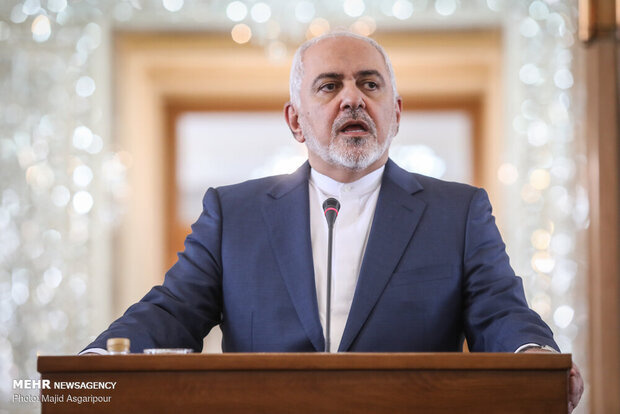Zarif: IAEA chief’s Iran visit not related to U.S. snapback move

Grossi wrote in a post on his Twitter account on Saturday that he is scheduled to visit Tehran “for meetings with Iranian authorities.”
“I will travel to Tehran on Monday for meetings with Iranian authorities to address outstanding questions related to safeguards in Iran,” he wrote. “I hope to establish a fruitful and cooperative channel of direct dialogue. It is necessary.”
Speaking to reporters on Monday, Zarif also said the snapback mechanism is an incorrect term which the Americans coined, but as 13 countries out of 15 UN Security Council members announced, the U.S. is not entitled to reimpose the UN sanctions on Iran, Mehr reported.
‘Americans are in a very bad situation’
“It’s not that they are only against the U.S. move, rather, they say the U.S. is not even entitled to enter such matter,” he asserted. “That’s why [the Americans] are in a very bad situation.”
The remarks came after U.S. Secretary of State Mike Pompeo officially informed the UN Security Council it is demanding the restoration of all UN sanctions on Iran, insisting that the U.S. has the legal right to “snap back” UN sanctions even though U.S. President Donald Trump pulled out of the UNSC-endorsed nuclear deal between Iran and six major powers.
Meanwhile, China, Russia, and the three European countries known as E3 rejected Washington’s argument that it can trigger the “snapback” mechanism.
In his Monday remarks, the foreign minister also pointed to a fatwa (Islamic ruling) by Leader of the Islamic Revolution Ayatollah Ali Khamenei against the development of nuclear weapons, saying, “We’ve never been after nuclear weapons and will never do so.”
He said Iran regards the development of nuclear weapons as a morally wrong act and a wrong strategic move.
Zarif further pointed to the Iraqi dictator’s use of chemical weapons against Iran in the 1980s and said, “As history shows, we’ve been the victims of chemical weapons but we’ve never used chemical weapons.”
He also reiterated Iran’s readiness to cooperate with the International Atomic Energy Agency (IAEA), adding that the Islamic Republic will not allow the U.S. and Israel, which possess nuclear weapons, to ridicule the IAEA’s objectives.
Washington has accused Tehran of violating the 2015 nuclear pact, which Trump unilaterally withdrew from in May 2018 while denouncing it as the “worst deal ever”.
The U.S. move to trigger the snapback mechanism came a week after its efforts to extend the UN arms embargo on Tehran failed miserably. Only the Dominican Republic joined Washington in voting yes.
The United States argues that it can trigger the sanctions snapback process because the 2015 Security Council resolution still names it as a nuclear deal participant.
However, in a joint letter to the Security Council on Thursday hours after the U.S. submitted it complaint, Britain, Germany and France said: “Any decisions and actions which would be taken based on this procedure or on its possible outcome would also be devoid of any legal effect.”
Observers have also questioned the legality of Washington’s anti-Iran move.
A professor of political science at Case Western Reserve University says the U.S. attempts to trigger the snapback mechanism has left the country isolated.
“The U.S. appears to be isolated on this issue because Trump pulled the country out of the JCPOA,” Professor Karl Kaltenthaler told ILNA in an interview published on Monday.
“It appears clear that other parties to the JCPOA believe the U.S. cannot leave the agreement and then dictate what happens under it,” Kaltenthaler said.
He underlined that most other countries on the UN Security Council do not believe the U.S. has the right to invoke the snapback mechanism.
“While there is a higher probability that the U.S. will come back to try to renegotiate the JCPOA with Iran if Biden wins, it is not a foregone conclusion that such negotiations will be successful,” he stated.
The professor added that if Trump wins re-election, “We can expect more of the same posture from the U.S. toward Iran. If Biden wins, the relationship can improve but it is not necessarily a given that a major improvement will occur.”
Source: Tehran Times

